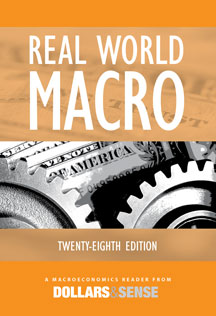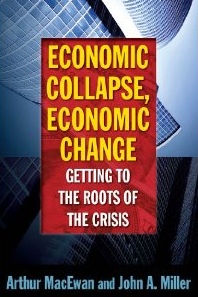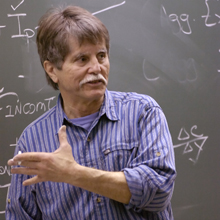Professor of Economics, Emeritus
Business and Economics Department
Education
Ph.D., University of Pittsburgh
B.A., Washington & Jefferson College
About
Main Interests
I have taught at Wheaton College since September 1979. During that time my research interests have varied. For several years I wrote about economic crisis theory and the effect of government taxing and spending policies on economic crises. I also did research on Marxism and Feminism and on women’s unemployment patterns and how they differed from those of men. That research was inspired by Wheaton’s efforts to integrate “the new research on women” into our curriculum. In the late 1980s I became interested in anti-speculation taxes and in particular the Land Gains Tax in place in Vermont. During the 1990s I began studying rapid growth in Southeast Asia and its effect on poverty and working people. In 1996 I spent the year in Southeast Asia as a Fulbright Research Scholar Research working with James Goodno, an economic journalist, on that project and with the Southeast Asia Office of Oxfam America. We visited and worked with non-governmental organizations and poor peoples’ movements in Malaysia, the Philippines, and Thailand.
Other Interests
In addition, to my teaching at Wheaton, academic research, and my work with Dollars & Sense magazine, I have been active in several political movements. During the 1980s I was part of the Providence, R.I -Niquinohomo, Nicaragua Sister City Project and worked in Nicaragua for two summers. I currently work with United For A Fair Economy (UFE), a Boston-based economic justice group. I have made several radio appearances and some televisions appearances on behalf of UFE. I have also worked with Boston Uncut, the protest group that battles cuts in social spending and corporate tax dodging. In October 2011, I was part of a Dollars & Sense economic forum at Occupy Boston.
Another interest of mine is cycling, both recreational cycling and bicycles as an alternative means of urban transportation. I am a supporter of Bikes Not Bombs, a Boston-based group that works with inner-city youth refurbishing bicycles and then distributing them in Boston and in the developing world. I am also an active cyclist and an avid fan of bicycle racing. I have ridden several bicycle tours in New England, including the Mount Washington Hill Climb. Also a few years ago my partner Ellen and I toured Tuscany, Italy by bicycle. We loved it.
Publications
My curriculum vitae above lists all of my publications. Below are my publications available online without a fee.
Articles
“Teaching about Sweatshops and Globalization”, Review of Radical Political Economics, Volume 36, No. 3, Summer 2004, 321-327.
“Why Economists Are Wrong about Sweatshops and the Anti-Sweatshop Movement,” Challenge, January-February 2003,Volume 46, no 1, pp. 93-122.
“Teaching About Sweatshops and the Global Economy,” Teaching about Sweatshops and The Global Economy Radical Teacher, # 61, Fall 2001, pp. 8 – 14.
“Military Spending and Economic Crises: A Comment on Gottheil and Riddell,” The Journal of Post-Keynesian Economics, Winter 1987-88, Vol. X, No. 2.
“Interactive Computer Lessons For Introductory Economics: Guided Inquiry from Supply and Demand to Women in the Economy,” with Gordon Weil. The Journal of Economic Education, Spring l986.
Book Reviews and Other Short Articles
“Linking Faculty Raises to College Resources,” Academe, Jan./Feb. 2006.
“Commodity Fetishism: A Concept for Organizing against sweatshop labor and Neoliberal Globalization,” MRzine, Nov. 12, 2005.
“Tribute to David Houston,” MRzine, September 1, 2005.
“Lift the Cap on Social Security,” MRzine, July 16, 2005.
“Malaysia and The Myth of Self-Regulating Markets,” World Policy Journal, Summer 2002, Volume XIX, No. 2, pp. 100-105.
Articles from Dollars & Sense Magazine
“Why the United States is Not Greece,” by John Miller and Katherine Sciacchitano, Dollars & Sense, no. 298, January/February 2012.
“Government ‘Living Within Its Means’? Claims about budget balancing are baloney,”by John Miller, Dollars & Sense, no. 297, November/December 2011.
“The People’s Budget: A Plan to Get Deficit-Reduction Off Our Backs,” by John Miller, Dollars & Sense, no. 296, September/October 2011.
“The Political Manipulation of ‘Missing Girls”, by John Miller, Dollars & Sense, no. 296, September/October 2011.
“No Fooling—Corporations Evade Taxes: Forbes finally notices what has been clear for years,” Dollars & Sense, no. 294, May/June 2011.
“A Dirty Job No One Should Do: A lawyer’s self-serving defense of Wall Street pay doesn’t add up.” Dollars & Sense, no. 293, March/April 2011.
“Unemployment: A Jobs Deficit or a Skills Deficit,” with Jeannette Wicks-Lim. Dollars & Sense, no. 292, Jan./Feb. 2011.
“That Hurt! Let’s Do it Again,” Dollars & Sense, no. 291, Nov./Dec. 2010.
“Laffer’s Latest Curve Ball,” Dollars & Sense Website, Oct. 18, 2010.
“Employers Go on Strike — Because They Can,” Dollars & Sense, no. 289, July/August 2010.
“The ‘Obamacare’ Tax Hike and Redistribution”, Dollars & Sense,
no. 288, May/June 2010.
“Bad News, Good News, and Class Conflict,” Dollars & Sense,
no. 286, Jan./Feb. 2010.
“How I Learned to Stop Worrying and Love the Deficit,” Dollars & Sense,
no. 285, Nov./Dec. 2009.
“(Economic) Freedom’s Just Another Word for … Crisis-Prone,” Dollars & Sense, no. 284, Sept./Oct. 2009.
“The Real Unemployment Rate Hits a 68-Year High,” Dollars & Sense, no. 283, July/August. 2009.
“Stimulating Whining: The prospect of bigger government sets some in the business press howling,” Dollars & Sense, no. 281, March/April 2009.
“Climate Reality Eludes “How I Learned to Stop Worrying and Love the Deficit,” the Business Press,” Dollars & Sense, no. 277, July/August 2008.
“Go Ahead and Lift the Cap: Assessing a Campaign Flyer on Social Security,” Dollars & Sense, no. 275, March/April 2008.
“Stormier Weather: The economic recovery is probably over—too bad many Americans never got to experience it,” Dollars & Sense, no. 274, Jan./Feb. 2008.
“Inequality Worsens Across Asia: The Wall Street Journal Cheers,” Dollars & Sense, no. 273, Nov./Dec. 2007.
“Nike to the Rescue? Africa Needs better jobs, not sweatshops,” Dollars & Sense, no. 267, September/October 2006.
“What’s Good for Wal-Mart …,” Dollars & Sense, no. 263, January/ February 2006.
“Taxing Wealth Swedish Style,” Dollars & Sense, no. 261, September/October 2005.
“Outing Alan Greenspan,” Dollars & Sense, no. 260, July/August 2005.
“Free, Free at Last: Economic freedom for corporations has little to do with either political freedom or economic growth,” Dollars & Sense, no. 258, March/April 2005.
“Dollar Anxiety: Real Reasons to Worry,” Dollars & Sense, no. 257, Jan./Feb. 2005.
“The Social Security Administration’s Cracked Crystal Ball,” Dollars & Sense, no. 256, Nov./Dec. 2004.
“Slow Wage Growth but Soaring Profits in the Current Recovery,” Dollars &Sense, no. 255, Sept./Oct. 2004.
“Ronald Reagan’s Legacy: His destructive economic policies do not deserve the press’s praise,” Dollars & Sense, no. 254, July/August 2004.
“High and Dry: The Economic Recovery Fails to Deliver,” Dollars & Sense, no. 252, March/April 2004.
“Double Taxation Double Speak.” Dollars & Sense, no. 246, March/April. 2003.
“The 1990s, The Decade of the Worker: Business Week’s April Fool’s Joke,” Dollars & Sense, no. 242, July/August 2002.
“Silent Depression: Economic Growth and Prosperity Part Company,” Dollars & Sense, no. 242,July/August 2002.
“The Surplus Vanished,” Dollars & Sense, no. 240, March/April 2002.
“Recession for the Holidays,” Dollars & Sense, no. 239, Jan./Feb. 2002.
“Still a Bad Idea: The Bush Tax Cut,” Dollars & Sense, no. 234, March/April 2001.
“Repeal of The Estate Tax: Dead For Now But How Long?” Dollars & Sense, no. 232,Nov./Dec. 2000.
“Know Nothings and Know It Alls,” with Jessica Collins. Dollars & Sense, no. 231, Sept./Oct. 2000.
“IMF Under Siege.” Dollars & Sense, no. 218, July. /August 1998.
“A Maverick Wins the Nobel Prize.” Dollars & Sense, no. 209, Jan./Feb. 1997.
“A Green GNP: Taking the Environment Into Account,” Dollars & Sense,
No. 161, November 1990.
Teaching Interests
My current course offerings are below, each with a course description and the latest syllabus.:
- ECON 101 Introduction to Macroeconomics
- ECON 201 Macroeconomic Theory
- ECON 233 Sweatshops in the World Economy
- ECON 303 Public Finance
- ECON 311 History of Economic Thought
Over the years I have directed several students’ honors theses. Those students did impressive work. For instance, James Jarrett wrote an honor’s thesis on Aids in Uganda that assessed the effects of economic growth, world bank policies, and the presence of NGOs on the incidence of AIDS and the lifespan of HIV positive Ugandans. Taavi Raidma’s thesis, Microcapitalists or Debt Prisoners?, evaluated microfinance programs in Limpopo Province, South Africa. Ryan Patch wrote about microfinance programs in Nicaragua in thesis, Mass Media and the Effectiveness of Microcredit in Nueva Guinea, Nicaragua. Jake Maher’s thesis assessed the state of the U.S. middle class using the concepts developed to assess the sustainability a middle class in the developing world. Michael Latner examined the social and economic provisions of Mercosur, the trade and development pact among Argentina, Brazil, Paraguay, and Uruguay. And last year, Nick Kacher wrote Beyond the Big Tradeoff. Nick’s thesis argues that rising inequality and declining social mobility in the United States has not been associated with gains in efficiency as is often suggested in the economics literature.
Research Interests
My current research interests focus on two areas. First, as part of my research about the Southeast Asian economies I have taken an interest in the debate about sweatshops, labor standards, and poverty alleviation. For several years now I have taught a course about sweatshops and the global Economy. I also published articles about my experience teaching that course (“Teaching about Sweatshops and The Global Economy” and “Teaching about Sweatshops and Globalization”) as well as critique of what economists usually have to say about sweatshops and the antisweatshop movement (“Why Economists Are Wrong about Sweatshops and the Anti-Sweatshop Movement”).
Recently I finished Sweatshops and The Antisweatshop Movement: The debate among Economists, the manuscript of a reader on the debate among economists about sweatshops and the anti-sweatshop movement. The collection introduces readers to the heated debate among economists about sweatshops and what to do about them. It provides students, economists, policymakers, and general readers with a single source that brings together writings by both economists who defend sweatshop labor and economists who condemn it. I maintain a website about the book that I update periodically with new articles about the sweatshop debate (which is currently offline for maintenance).
 Second, for over two decades I have worked as a contributing editor to Dollars & Sense, a popular economics magazine, based in Boston, MA. I edit articles, edit and contribute to a classroom reader entitled Real World Macro, and write about macroeconomics and financial instability (e.g., the Great Recession and the sluggish economic recovery), tax and budget policies and globalization. My column, Up Against the Wall Street Journal, concentrates on debunking economic claims made in the business press. Several of my articles from Dollars & Sense are available online and are listed below.
Second, for over two decades I have worked as a contributing editor to Dollars & Sense, a popular economics magazine, based in Boston, MA. I edit articles, edit and contribute to a classroom reader entitled Real World Macro, and write about macroeconomics and financial instability (e.g., the Great Recession and the sluggish economic recovery), tax and budget policies and globalization. My column, Up Against the Wall Street Journal, concentrates on debunking economic claims made in the business press. Several of my articles from Dollars & Sense are available online and are listed below.
 Also Arthur MacEwan, a founder of Dollars & Sense, and I recently published Economic Collapse, Economic Change: Getting to the Roots of the Crisis. The central argument of our book is that the economic crisis, which emerged in 2007, had its origin in a nexus of economic inequality, elite (undemocratic) power, and a perverse leave-it-to-the-market ideology that has developed over recent decades. The substance of the book both traces the development of the crisis and explains how this nexus lies at its foundation. Consistent with our analysis, we argue that to establish long-run economic stability it is necessary to alter the conditions of inequality, power, and ideology. While the focus of the book is the situation in the United States, we also examine the connections between the crisis and global events. In October 2011 I spoke with the Real News Network about our book and the current economic crisis.
Also Arthur MacEwan, a founder of Dollars & Sense, and I recently published Economic Collapse, Economic Change: Getting to the Roots of the Crisis. The central argument of our book is that the economic crisis, which emerged in 2007, had its origin in a nexus of economic inequality, elite (undemocratic) power, and a perverse leave-it-to-the-market ideology that has developed over recent decades. The substance of the book both traces the development of the crisis and explains how this nexus lies at its foundation. Consistent with our analysis, we argue that to establish long-run economic stability it is necessary to alter the conditions of inequality, power, and ideology. While the focus of the book is the situation in the United States, we also examine the connections between the crisis and global events. In October 2011 I spoke with the Real News Network about our book and the current economic crisis.
You can learn more about the book or order a copy through the link provided by the title.
